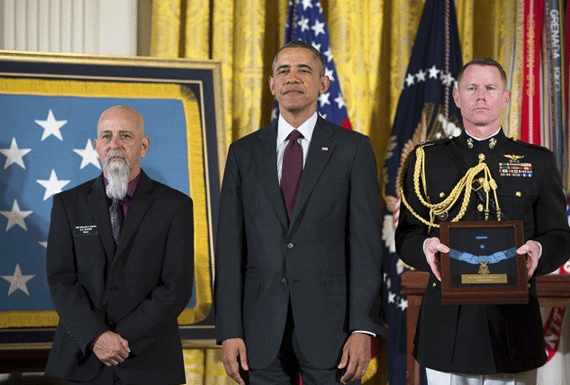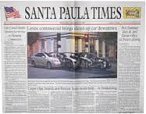
|
President Barack Obama presented Pete Corrall of Meiners Oaks (left) with the Medal of Honor to note the valor of Corrall’s late uncle US Army 1st Class Sgt. Eduardo Gomez, whose bravery under fire during the Korean War has now garnered him the nation’s highest military honor. Official White House Photo by Pete Souza |
Eduardo Gomez: Santa Paula woman attends
Medal of Honor ceremony for ‘Lalo’
April 23, 2014
By Peggy Kelly
Santa Paula News
A soldier described as “such a nice man, a gentleman always caring and giving to the family,” was recognized for also caring and giving to his country when the late US Army 1st Class Sgt. Eduardo Gomez was honored with a Medal of Honor, the nation’s highest service award.
President Barack Obama awarded the Medal of Honor to 24 Army veterans for conspicuous gallantry, correcting what was in some cases decades of discrimination, on March 18 at the White House.
The veterans were honored for their valor during major combat operations in World War II, the Korean War and the Vietnam War; among the recipients were 19 Hispanic, Jewish and African-American veterans overlooked previously because of their racial or ethnic backgrounds. Three of the recipients are still living.
All had previously been recognized with the Distinguished Service Cross, the nation’s second highest military award, which was upgraded to the Medal of Honor in recognition of their gallantry, intrepidity and heroism above and beyond the call of duty.
Beatrice “ChaCha” Corrall of Ojai, whose family was originally from Santa Paula, said they all were thrilled at the award and proud of her Uncle Eduardo, who served in World War II and Korea.
Her late father Richard Corrall, had a barber shop on Ojai Street, and although his brother Eduardo never lived in Santa Paula he was a welcome visitor, “We always loved to see him, such a nice man,” said Corrall.
Her mother, 85-year-old Margaret Moreno, went to Washington for the ceremony.
An extended family member, Frances Meatty of Santa Paula, also attended, an experience that combined her first trip to the nation’s Capitol with seeing the President of the United States.
“I’ve been to other places but never Washington... wow, it was such a beautiful place,” and said Meatty, “I was honored being there with all those people getting awards,” including three living military members honored for more recent actions.
Meatty first met Gomez “When he accompanied my uncle’s body back to Santa Paula after he was killed in an automobile crash,” while in the service in 1953.
“My uncle never made it to Korea... and that’s when I met Lalo,” she noted using Gomez’s nickname.
A native of Los Angeles who grew up in Mexico, Gomez was stateside recovering from wounds he received in battle.
Meatty said she saw Gomez over the years, the last time in 1962 when she picked him up in Phoenix for a trip to Mexico.
“Relatives actually tried to fix me up with him later, when I was widowed,” Meatty noted with a laugh.
“He was such a nice man, a gentleman... always caring and giving to the family... “
Gomez gave a lot to many: his Medal of Honor came about 64 years after his heroic actions to save his men in a rice paddy near Tabu-dong, South Korea where he was wounded in action.
On Sept. 3, 1950, a regiment of Chinese and North Koreans attacked Gomez and his men as the Americans were helping to set up a defensive perimeter. Although rocket fire managed to stop several enemy tanks another kept firing and advancing until, in full view of the enemy, Gomez crawled some 30 yards to the tank, climbed onto it, opened the hatch and threw in a grenade. The explosion riddled his upper torso with shrapnel.
When Gomez returned to his machine-gun post he held his position as the enemy advanced, providing protective cover fire for his men even though he had been wounded and his hands also burned from the heat of the machine-gun he manned without a tripod.
When the battle was over Gomez not only declined to be evacuated, but he also refused medical treatment.
His valor occurred during one of the early major battles of the Korean War; he had also landed on Omaha Beach on D Day during World War II, but the family remembers he always had little to say about his heroic acts, although he was proud of his military career.
Gomez retired from the military after 30 years and died in 1974 of a heart attack in Mexico City.
When the awarding of the medals was announced Abraham H. Foxman, National Director of the Anti-Defamation League, said, “Justice delayed is better than justice denied. It is a very welcome effort and show of sensitivity by this administration to seek to redress acts of discrimination, and it is especially laudatory that it relates to our soldiers who fought so bravely on behalf of this country in America’s wars.”
Those who knew Gomez said he never voiced any instances of discrimination that occurred while he served, and being overlooked for the military’s highest honor did not concern him.
“Lalo was a modest man, a very brave leader and soldier,” said Meatty, “just a wonderful man... “



